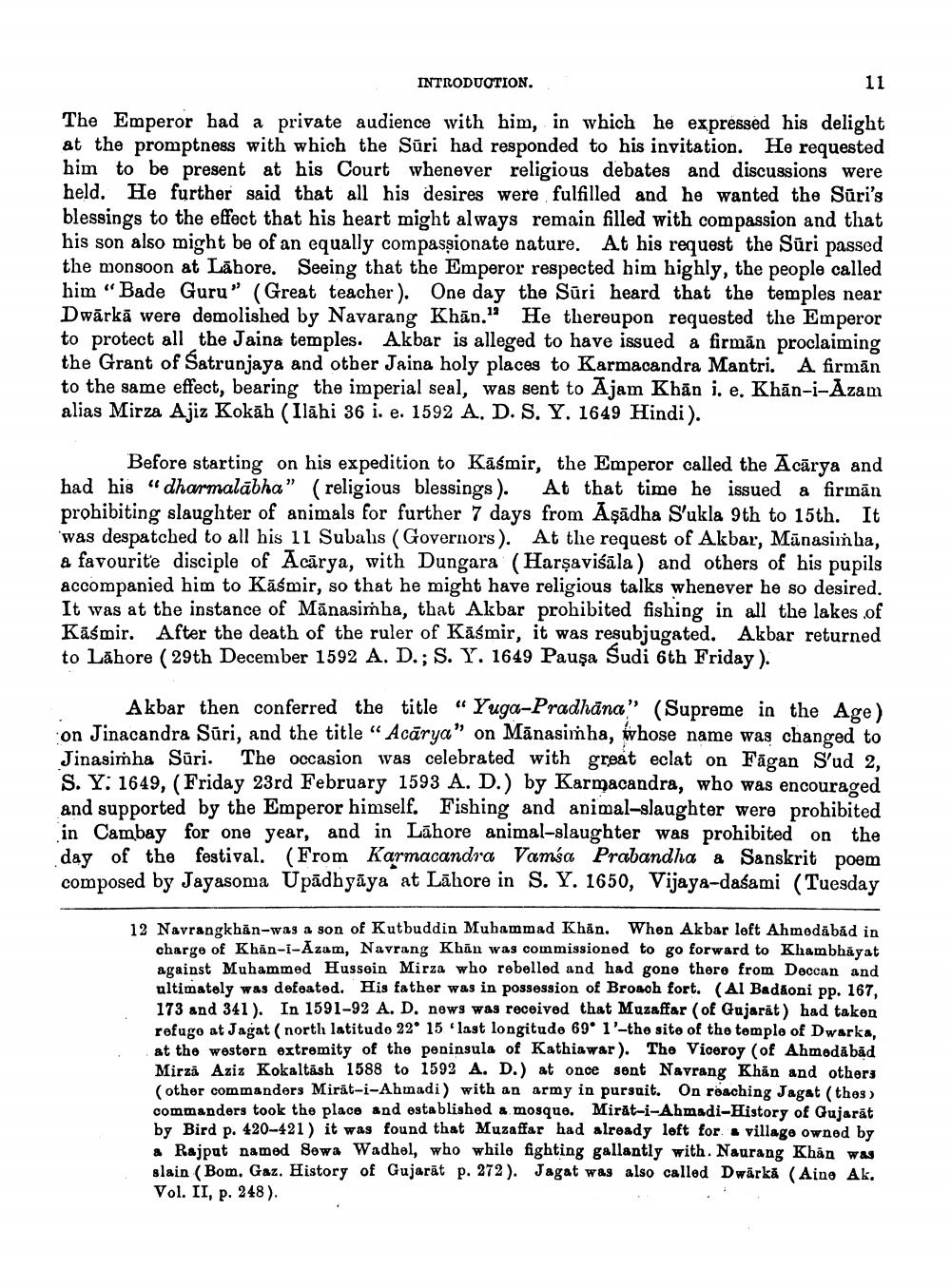________________
INTRODUCTION.
11
The Emperor had a private audience with him, in which he expressed his delight at the promptness with which the Sūri had responded to his invitation. He requested him to be present at his Court whenever religious debates and discussions were held. He further said that all his desires were fulfilled and he wanted the Sūri's blessings to the effect that his heart might always remain filled with compassion and that his son also might be of an equally compassionate nature. At his request the Sūri passed the monsoon at Lābore. Seeing that the Emperor respected him highly, the people called him “Bade Guru” (Great teacher). One day the Sūri heard that the temples near Dwārkā were demolished by Navarang Khān." He thereupon requested the Emperor to protect all the Jaina temples. Akbar is alleged to have issued a firmān proclaiming the Grant of Satrunjaya and other Jaina holy places to Karmacandra Mantri. A firman to the same effect, bearing the imperial seal, was sent to Ajam Khān i. e. Khān-i-Azam alias Mirza Ajiz Kokāh (Ilāhi 36 i. e. 1592 A. D. S. Y. 1649 Hindi).
Before starting on his expedition to Kāśmir, the Emperor called the Acārya and had his “dharmalābha” (religious blessings ). At that time he issued a firmān prohibiting slaughter of animals for further 7 days from Aşādha S'ukla 9th to 15th. It was despatched to all his 11 Subahs (Governors). At the request of Akbar, Mānasimha, a favourite disciple of Acārya, with Dungara (Harsaviśāla) and others of his pupils accompanied him to Kāśmir, so that he might have religious talks whenever he so desired. It was at the instance of Mānasiṁha, that Akbar prohibited fishing in all the lakes of Kāśmir. After the death of the ruler of Kāśmir, it was resubjugated. Akbar returned to Lāhore ( 29th December 1592 A. D.; S. Y. 1649 Pauşa Sudi 6th Friday).
Akbar then conferred the title “ Yuga-Pradhana" (Supreme in the Age) on Jinacandra Sūri, and the title “ Acārya” on Mānasimha, whose name was changed to Jinasimha Sūri. The occasion was celebrated with great eclat on Făgan S'ud 2, S. Y: 1649, (Friday 23rd February 1593 A. D.) by Karmacandra, who was encouraged and supported by the Emperor himself. Fishing and animal-slaughter were prohibited in Cambay for one year, and in Lāhore animal-slaughter was prohibited on the day of the festival. (From Karmacandra Vamsa Prabandha & Sanskrit poem composed by Jayasoma Upādhyāya at Lāhore in S. Y. 1650, Vijaya-daśami (Tuesday
12 Navrangkhăn-was a son of Kutbuddin Muhammad Khăn. When Akbar left Ahmodābād in
charge of Khăn-i-Azam, Navrang Khan was commissioned to go forward to Khambhăvat against Muhammed Hussein Mirza who rebelled and had gone there from Deccan and ultimately was defeated. His father was in possession of Broach fort. (Al Badãoni pp. 167, 173 and 341). In 1591-92 A. D. news was received that Muzaffar (of Gujarat) had taken refugo at Jagat (north latitudo 22' 15 last longitude 69' 1'-the site of the temple of Dwarka, at the western extremity of the peninsula of Kathiawar). The Viceroy (of Ahmedābād Mirza Aziz Kokaltash 1588 to 1592 A. D.) at once sont Navrang Khan and others (other commanders Mirät-i-Ahmadi) with an army in pursuit. On reaching Jagat (thes) commanders took the place and established & mosque. Mirăt-i-Ahmadi-History of Gujarat by Bird p. 420-421 ) it was found that Muzaffar had already left for • village owned by a Rajput named Sewa Wadhel, who while fighting gallantly with. Naurang Khan was slain (Bom. Gaz. History of Gujarāt p. 272). Jagat was also called Dwarkı (Aine Ak. Vol. II, p. 248).




